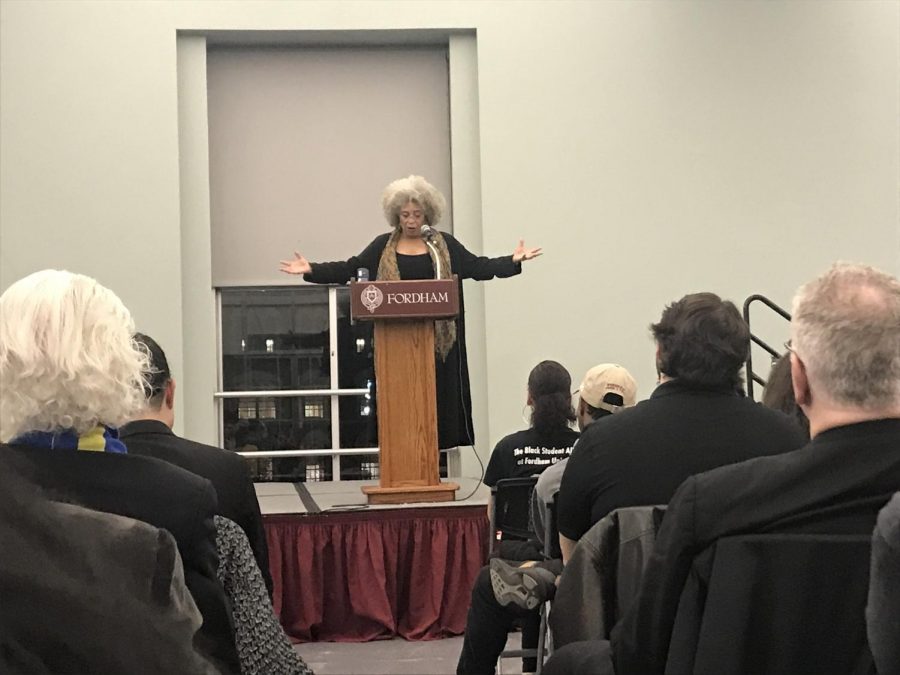Angela Davis Speaks to Packed Room
By Eliot Schiaparelli
Angela Davis spoke to a packed room in McGinley second at Fordham University on Feb. 25. Despite having midterms, hundreds of students showed up to see the activist and hear her talk about her life and work.
The Black Student Alliance at Fordham (ASILI) organized the event. According to Anya Patterson, president of ASILI, they started planning for this year’s Black History Month speakers at least a year in advance. However, they did not receive funding to have Davis speak, however, until January of this year. Patterson said she felt the university needed to hear from someone like Angela Davis.
Students also may have noticed that the event, which had roughly 700 students in attendance according to Patterson, was a bit crowded. Patterson said this was because they had trouble securing space for the event.
“I was determined that we would have this event and it would not just benefit my club but the whole school community,” said Patterson. “Whenever we were told no, we said who else can we talk to?”
Davis is a political activist, writer and scholar. Over the course of her career, she has gone from a fugitive on the FBI’s most wanted list to writing indictments of the prison system after being acquitted. She is also well-known for being a feminist and a member of the communist party.
Patterson, who said she has read all of Davis’ books and quoted her in many papers, called her a trailblazer and walking history.
“It was amazing,” said Patterson. “I feel like it was a once-in-a-lifetime thing especially with the issues she spoke on.”
Davis spoke on a range of issues, from Black History Month, to feminism, to Islamophobia and to intersectionality.
On the topic of Black History Month she talked about early treatment of indigenous people in America to great cheers from the audience.
“The United States was founded on the notion that it was the very best incarnation of democracy that the world had ever seen, but it was a flawed conception of democracy,” she said. “It did not represent justice, equality and freedom for all. As a matter of fact, this flawed democracy was created on the violent suppression of others.”
She went on to say more about how black history is connected to the history of indigenous people. She also said that early democracy excluded working class people, women and African Americans. She pointed out connections, both positive and negative, recent and long ago, between black history and the larger histories of America.
To the laughter of the audience, Davis also referenced President Donald Trump, calling him “the current resident of 1600 Pennsylvania Avenue.”
Throughout her speech, Davis did what she has always done, questioned the way things are. Specifically, she talked about the death penalty as a racist institution.
“Perhaps the world needs to be rearranged,” said Davis. She later continued, “We have work to do and we’re just beginning to do the work that should have been done in the aftermath of slavery.”
On the topic of feminism, she identified different types from “bourgeois white feminism” to “abolition feminism” to “carceral feminism.”
“All feminisms are not created equal,” said Davis.
The crowded room gave Davis multiple long standing ovations at the beginning and end of her speech. She concluded with advice for the audience.
“Whenever you are offered a simple solution, question it,” said Davis. “You can’t have inclusion without transformation and diversity without justice.”
In the future, Patterson said she hopes the university will continue to bring speakers like Davis.
“I hope they bring meaningful and challenging speakers,” she said, “who will force students to think critically about issues and provide them with different perspectives than they currently have.”







































































































































































































